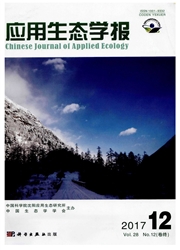

 中文摘要:
中文摘要:
将28头泌乳奶牛随机分成A、B、C、D4组,分别按每头0(对照)、6.0、12.0和16.0mg剂量静脉注射经生理盐水溶解的Zn—MT,以探讨外源性金属硫蛋白(MT)对奶牛抗热应激的调控作用及其机理.结果表明:B、C和D组的脉搏、呼吸频率及血清MDA含量均显著(P〈0.05或P〈0.01)低于A组;4%标准乳产量、血液GSH—Px活性、红细胞SOD活性、血清MT含量、奶MT含量及SOD基因表达水平均显著(P〈0.05或P〈0.01)高于A组;C和D组的上述各项指标又优于(P〈0.05或P〉0.05)B组;外源性MT的调控效果以注射后第30天表达最佳.说明MT是一种能够有效调控奶牛热应激能力的生理活性物质,且在奶牛体内表现出一定的剂量效应和时间效应.
 英文摘要:
英文摘要:
To approach the effects of exogenous metallothionein (Zn-MT) on the thermoresistance and SOD gene expression of dairy cattle, an experiment was conducted with 28 lactating cows, which were randomly allocated to groups A, B, C and D, and supplemented with 0, 6. 0, 12.0 and 16.0 mg Zn-MT ·capita^-1, respectively, by intravenous injection. The results showed that the pulse, breath rate, and serum MDA content of the cows in groups B, C and D were lower (P 〈 0. 05 or P 〈0. 01 ), while their milk yield, serumand milk MT contents, blood GSH-PX activity, erythrocyte SOD activity, and SOD gene expression level were higher (P 〈0. 05 or P 〈0. 01 ) than those in group A. All the test indices of the cows in groups C and D were superior (P 〈 0. 05 or P 〉 0.05 ) than those in group B, but no significant difference (P 〉 0. 05 ) was observed between groups C and D. Exogenous Zn-MT had the best effects on the thermoresistance and SOD gene expression of dairy cattle 30 days after injection. All of these suggested that exogenous Zn-MT should be a physiologically active substance effective to the thermoresistance and SOD mRNA expression of dairy cattle, and presented time- and dose-dependent effects.
 同期刊论文项目
同期刊论文项目
 同项目期刊论文
同项目期刊论文
 期刊信息
期刊信息
